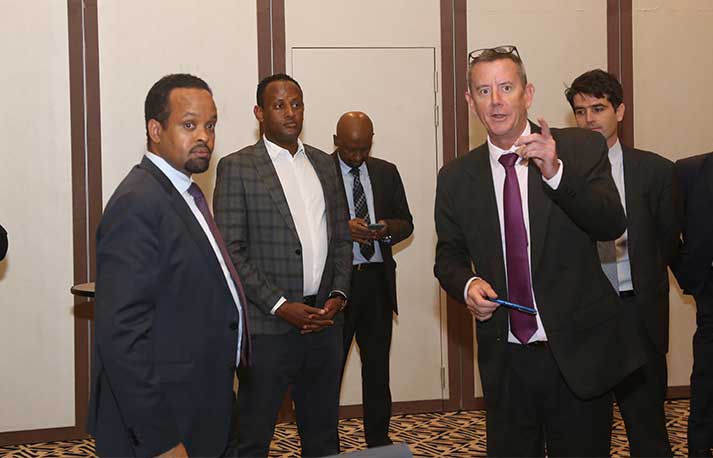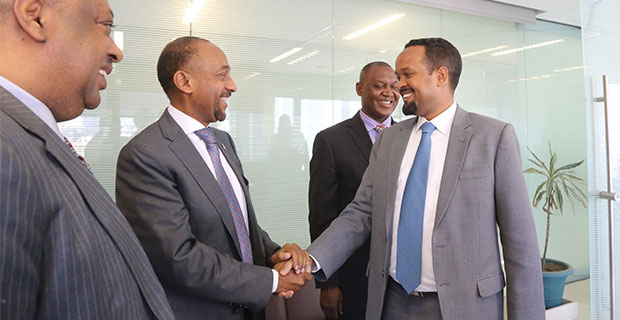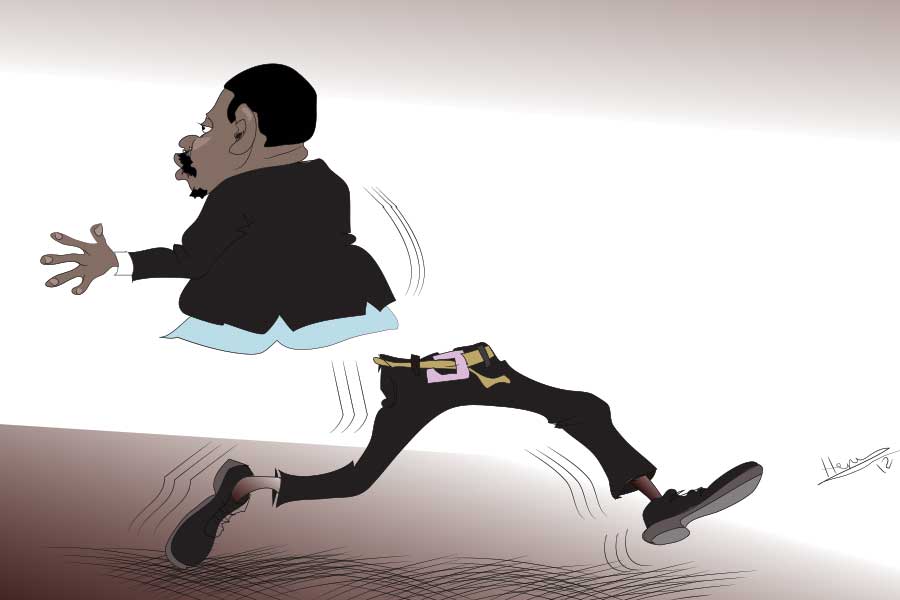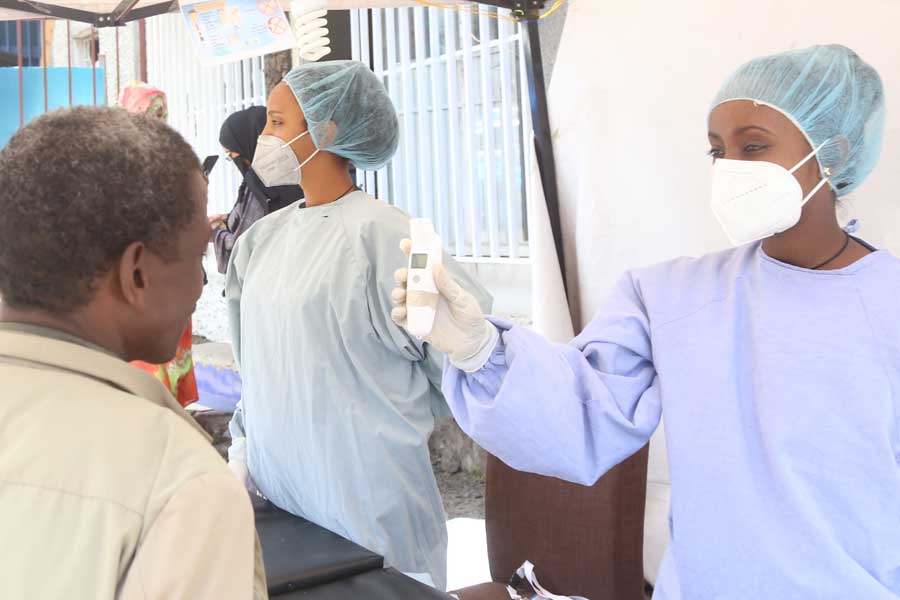
Aug 29 , 2020
By Mohammed A. Nurhussein (MD)
Ethiopia has been on a roller coaster ride since widespread protests erupted in 2015, leading to the demise of the administration led by Prime Minister Hailemariam Desalegn and the emergence of Abiy Ahmed (PhD) as Ethiopia’s new premier in the spring of 2018.
The high expectations that greeted his appointment have now given way to serious doubts. The country seems to be lurching from one crisis to another and is now facing a perfect storm in the making.
I was in Addis Abeba two years ago when Prime Minister Abiy came to power, and I was able to witness the frenzy with which Ethiopians welcomed his appointment. His acceptance speech was powerful and uplifting.
“T-shirts with the PM's photo were everywhere in Mesqel Square,” I wrote in a letter back then. “He addressed the crowd, and he didn't disappoint. A gifted orator, he spoke of forgiveness, unity and Ethiopian-ness. It resonated with the people.”
I could not help getting caught up in the mass euphoria myself.
He travelled to areas of community clashes to promote reconciliation and healing. Speaking in local languages, he extolled the bravery and sacrifice of fighters from the Tigray region. Within weeks, he freed journalists and thousands of prisoners. He lifted the state of emergency that was in place at the time and invited Ethiopian political groups abroad to return and participate in the political process.
His rapprochement with Eritrea was perhaps his boldest move. He travelled to Asmera to meet with President Isaias Afwerki, who reciprocated with a visit to Ethiopia. They agreed to a normalisation - through informal channels - of relations between the two countries, a move that earned the Prime Minister a Nobel Peace Prize in 2019.
Those were exciting times, full of possibilities but also fraught with peril. I added this note of caution in the letters I was writing at the time:
“Abiy Ahmed has the intellect - out of the box approach to solving problems. There are, however, storm clouds on the horizon. The mass adulation is worrisome and deeply troubling. It may lead to the emergence of a populist Prime Minister.”
Things have gone in a relatively different direction, but the danger was not avoided.
The Prime Minister got into hot water not long after his rise to office, most noticeably with the Tigray People’s Liberation Front (TPLF), which was largely believed to have exercised disproportionate power over the previous three decades. It did not sit well with the TPLF that the other members of the EPRDF coalition seemed to be absolved of responsibility.
OPDO and ANDM, which represented the Oromia and Amhara regional states within the EPRDF, respectively, rechristened ODP and ADP, were blamed for having made an alliance aimed against the TPLF. All of these differences were polarising, to say the least, and heightened tensions. Matters were not helped by the establishment of Prosperity Party in place of the EPRDF. Over the years, TPLF and other political forces describing themselves as “federalist” also came into opposition with Prosperity.
Worsening this problem of polarisation is the role of the media. One of the early welcome measures taken by the Prime Minister was allowing freedom of political speech. Privately-owned print and digital media proliferated. The press, unfortunately, lacked the requisite self-restraint and good judgment. Some broadcasts at times border on incitement to violence. Conspiracy theories and speculations abound.
Except for a few independent media outlets, the press serves the agenda of respective political ideologies. Resident commentators, self-styled historians and political entrepreneurs spin a convenient narrative to fit their viewpoint. Some spew hateful comments referring to lingo-cultural groups, seemingly oblivious to the consequences of their opinions.
The state of the economy is also in bad shape. Foreign direct investment is dwindling, and the availability of foreign currency is in its usual state of deficiency. A large number of unemployed youth is a powder keg. Young Ethiopians have been leaving their country in large numbers seeking jobs elsewhere for some years now.
They travel across lawless Libya to Europe or go to Egypt across Sinai to Israel. Others cross the Red Sea into war-torn Yemen with hopes of reaching Saudi Arabia or the UAE. They endure all kinds of abuse and humiliation. The women are routinely raped; others lose their kidneys to organ peddlers. Those who reach the Mediterranean Sea often perish in the unforgiving waters aboard their rickety boats with no ship willing to rescue them in these times of rising anti-immigrant nationalism in Europe.
All of this is because they could not find opportunities back home, or they did not believe they could. As political instability rocks the nation and the economy is battered, their lot will become worse.
The stark manifestations of the poor state of Ethiopia have been making themselves obvious for some time. Recently, the killing of Hachalu Hundessa, political activist and musician led to the loss of property and lives. The internet was shut down for two weeks after that.
Shortly after this episode, some of the major opposition politicians were rounded up and jailed, as were thousands of others who were suspected of being involved in the violence that occurred following Hachalu’s death.
An uneasy calm prevails at the moment, but mass demonstrations by activists have erupted in the US, Canada and Europe. Some condemned the PM and demanded his resignation. Others hailed him for jailing those they believed were perpetrators.
A spate of high-profile killings over the past two years have added to the anxiety, the most recent of which was that of Hachalu. Simegnew Bekele, chief engineer and lead project manager of the Great Ethiopian Renaissance Dam (GERD), was found dead in his car in Mesqel Square in 2018. His death was ruled a suicide. I took the loss of this patriotic Ethiopian and a dear friend personally. The assassination of Se’are Mekonnen (Gen.) and Ge’zae Abera (Maj.Gen.) in Addis Abeba and Ambachew Mekonnen (PhD) and his colleagues in Bahir Dar last year was another shocking incident.
Topping all of this, Ethiopia now faces three major crises, each of which will require all hands on deck to meet the challenge. Let us start with the GERD. The deadlocked negotiations over the Dam has raised the tension between Egypt and Ethiopia. An increase in hostilities would be catastrophic for both countries.
It is encouraging to see Ethiopians closing ranks on this issue. Our unity and resolve make us less vulnerable. It is Ethiopia’s sovereign right to use its share of the Nile water by building a hydroelectric dam to generate energy for its economic development.
Another worrying matter is the postponement of elections. It was supposed to take place this year, according to the Constitution, but was postponed because of the Novel Coronavirus (COVID-19) pandemic. Adding to the dilemma is the decision by Tigray Regional State to hold elections through its own election commission despite the National Electoral Board of Ethiopia (NEBE) saying that only it has the power to conduct them. Here is an opportunity for the PM to put his skills in conflict resolution into practice by reaching out to the Tigray regional government and finding common ground.
As the French philosopher Albert Camus said, “Peace is the only battle worth waging.”
Just as worrying is the COVID-19 pandemic. It has been surging at an alarming rate in Ethiopia lately. It may run a protracted course in Africa over the next “few” years, according to the World Health Organisation (WHO). This once-in-a-century global scourge has already wreaked havoc on the public health systems and economies of some of the most advanced nations in the world. One can only imagine what this could do to African countries with weak health systems and fragile economies if it lasts for a few years.
Our collective effort is needed to meet these challenges. One important element of this is the need for political elites to engage one another, instead of talking past each other. Differing views and cross-fertilisation of ideas are healthy and can only enrich both sides of the debate.
We have been attacking each other’s ethnicity, religion and politics for such a long time that we have failed to realise that we have driven the country to the edge of a precipice, consumed by our virulent polemics and hate messages.
We ought to take a deep breath and appreciate how our multicultural country is better and stronger when it celebrates and recognises its diversity.
“Our ability to reach unity in diversity will be the beauty and the test of our civilisation,” said Mahatma Gandhi, facing problems in India not unlike our own.
Let us show the world that our ancient civilisation can indeed rise to the challenge. We need to recognise that we are not each other’s enemy but do face common challenges - poverty, lack of political maturity and now a terrifying pandemic. The latter is on top of pre-existing heavy disease burdens, such as malaria, tuerclosis, cholera and typhoid fever, that claim too many lives.
Remember the oft-quoted Ethiopian saying, diir bi’abir Anbessa yassir– which loosely mean that many cobwebs together can cage a lion.
The path to peace is through dialogue by fostering mutual understanding for the sake of the country and people we profess to love. There is an urgent need to step back from the precipice before it is too late.
PUBLISHED ON
Aug 29,2020 [ VOL
21 , NO
1061]


Agenda | Sep 30,2023

Radar | Nov 19,2022

Radar | Aug 28,2021

Radar | Aug 04,2024

Fortune News | Apr 04,2020

Fortune News | Nov 27,2018

Editorial | Oct 19,2019

Fortune News | Apr 12,2020

Radar | Jul 09,2022

Radar | Aug 05,2023

My Opinion | 131451 Views | Aug 14,2021

My Opinion | 127803 Views | Aug 21,2021

My Opinion | 125783 Views | Sep 10,2021

My Opinion | 123419 Views | Aug 07,2021

Dec 22 , 2024 . By TIZITA SHEWAFERAW
Charged with transforming colossal state-owned enterprises into modern and competitiv...

Aug 18 , 2024 . By AKSAH ITALO
Although predictable Yonas Zerihun's job in the ride-hailing service is not immune to...

Jul 28 , 2024 . By TIZITA SHEWAFERAW
Unhabitual, perhaps too many, Samuel Gebreyohannes, 38, used to occasionally enjoy a couple of beers at breakfast. However, he recently swit...

Jul 13 , 2024 . By AKSAH ITALO
Investors who rely on tractors, trucks, and field vehicles for commuting, transporting commodities, and f...

Jun 28 , 2025
Meseret Damtie, the assertive auditor general, has never been shy about naming names...

Jun 21 , 2025
A well-worn adage says, “Budget is not destiny, but it is direction.” Examining t...

Jun 14 , 2025
Yet again, the Horn of Africa is bracing for trouble. A region already frayed by wars...

Jun 7 , 2025
Few promises shine brighter in Addis Abeba than the pledge of a roof for every family...

Jun 29 , 2025
Addis Abeba's first rains have coincided with a sweeping rise in private school tuition, prompting the city's education...

Jun 29 , 2025 . By BEZAWIT HULUAGER
Central Bank Governor Mamo Mihretu claimed a bold reconfiguration of monetary policy...

Jun 29 , 2025 . By BEZAWIT HULUAGER
The federal government is betting on a sweeping overhaul of the driver licensing regi...

Jun 29 , 2025 . By NAHOM AYELE
Gadaa Bank has listed 1.2 million shares on the Ethiopian Securities Exchange (ESX),...